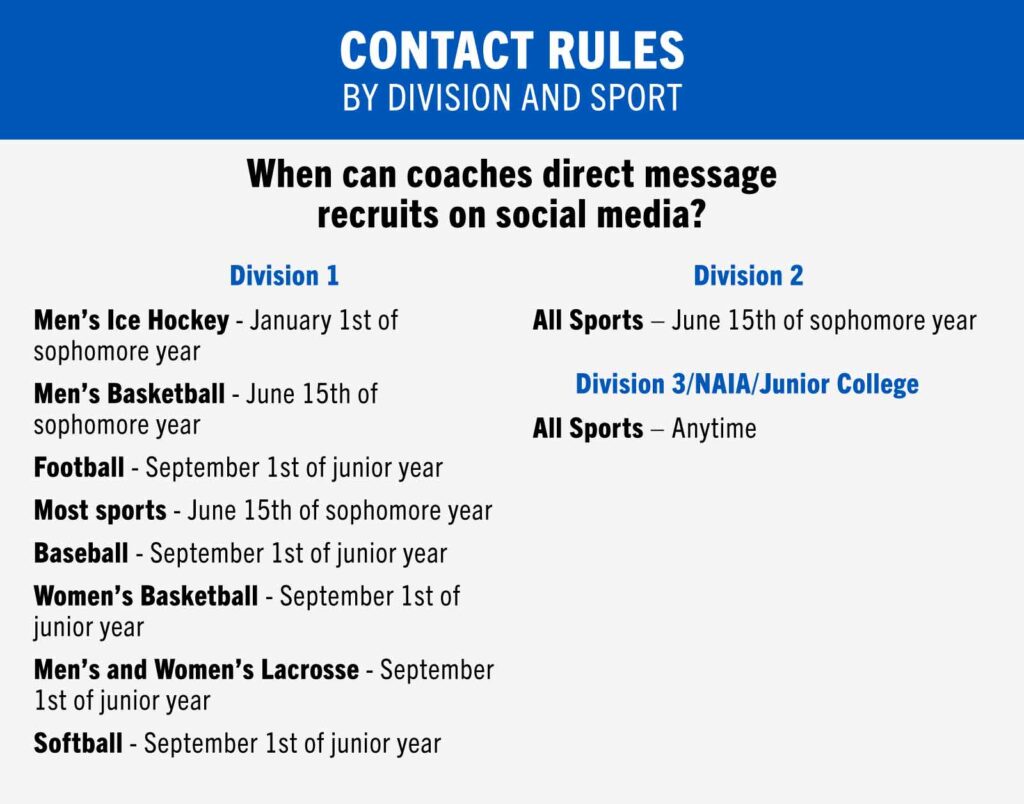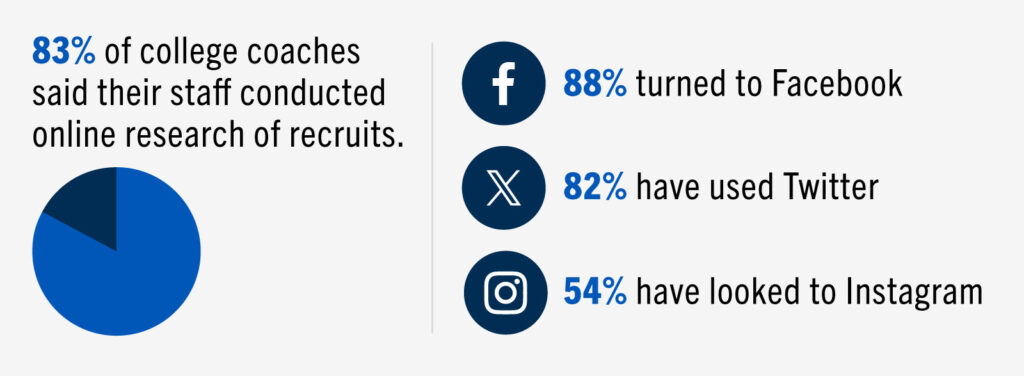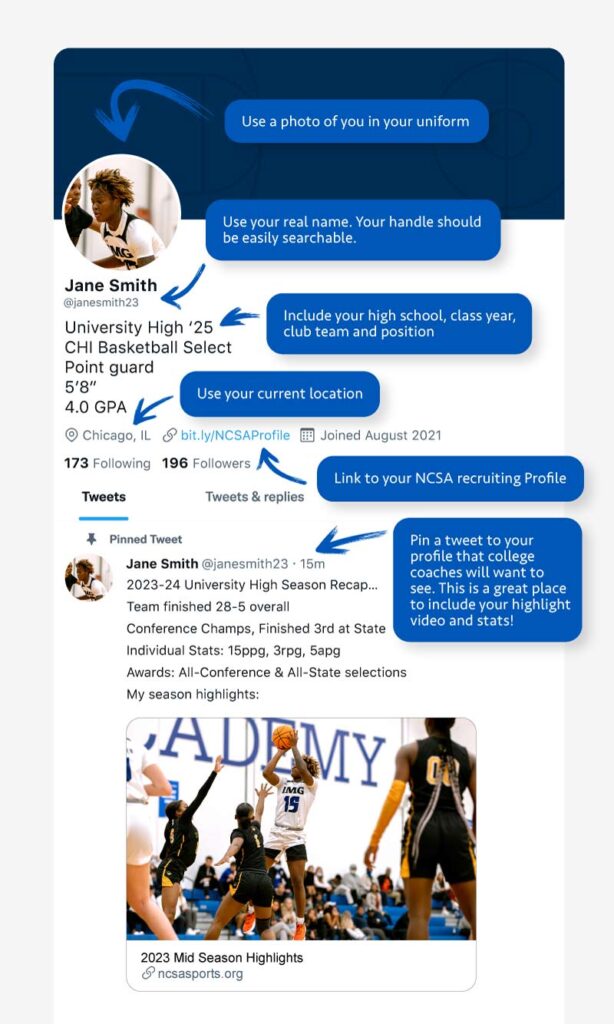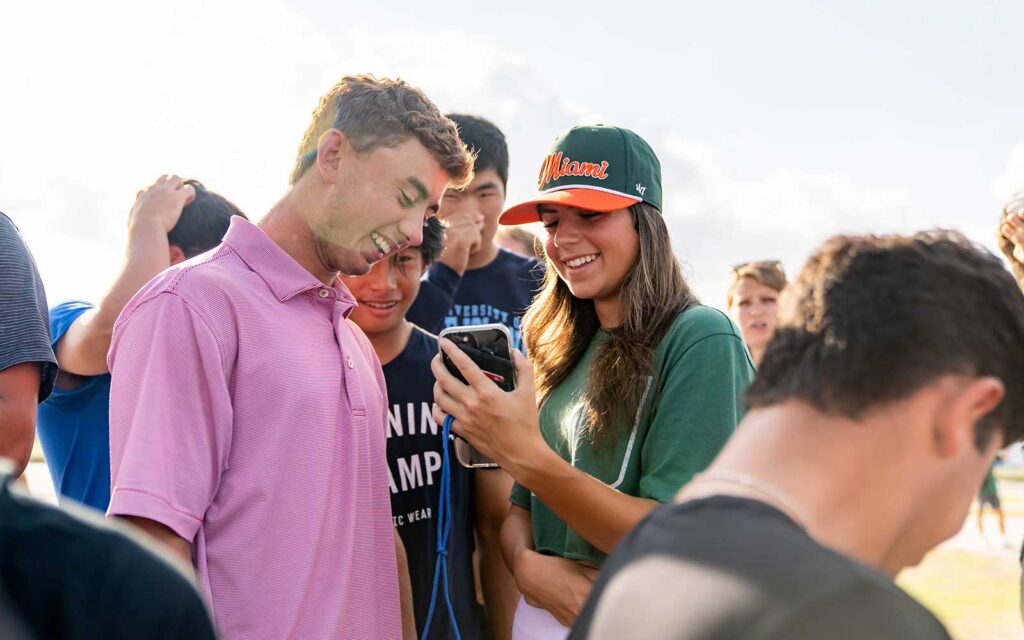A Guide for Student-Athletes Using Social Media for Recruiting
Often when social media and college recruiting pop up in the news, the articles tell cautionary tales of recruits who have lost an offer or a scholarship because of poor social media choices.
However, social media, when used properly, can be an effective recruiting tool. In fact, recruits can use the power of social media to contact coaches, show coaches what kind of recruit they are and even gain the attention of college coaches who weren’t previously recruiting them.
Quick Links
NCAA social media rules and policy for student-athletes
The NCAA social media recruiting rules for athletes and coaches are less restrictive than traditional recruiting rules. High school athletes are allowed to reach out to college coaches on social media at any time, public or private.
Coaches can communicate with recruits privately through a direct message (DM) once a sport’s contact period begins. NCAA social media rules allow coaches to “like” or “share” a student-athlete’s social media posts. However, coaches are prohibited from publicly commenting on a recruit’s social media profile until after the athlete has committed to their program. This is often referred to as the “click don’t type rule.”

Insider Tip: Many college coaches and athletic programs enforce their own social media policies that student-athletes are required to follow while representing the university. As you move through the recruiting process, be sure your social media presence and online behavior shows that you will be a reputable addition to their team.
how coaches use social media for recruiting athletes
Following the NCAA rules on social media and college recruiting, coaches can DM the recruits to introduce themselves or wish a recruit good luck before a big game. But most importantly, coaches turn to social media to get a better understanding of a recruit’s personality and character. Coaches can now connect, evaluate and gather information about a prospective student-athlete without ever leaving the office.
In fact, in a survey by Cornerstone Reputation, 83% of college coaches said their staff conducted online research of recruits. Of these coaches, 88% turned to Facebook, 82% have used Twitter and 54% have looked at Instagram to gain insight into a recruit’s character. Some coaches even use fake accounts to evaluate student- athletes and social media accounts.

B.J. Dunne, head basketball coach for Gettysburg College, discusses how he uses social media to identify prospective student-athletes. Check out this video where he explains how important social media is in college recruiting.
TIPS FOR ATHLETES USING SOCIAL MEDIA
- A well-managed athlete social media presence can increase a coach’s interest in recruiting you. Here’s how athletes can use social media for college recruiting to impress college coaches.
- Be visible. You probably already have a Twitter, Instagram and TikTok account that you use every day. Utilize all your social media platforms to increase your chances of getting noticed by college coaches.
- Use your resources. Do you play on a club team, or go to a personal trainer? Find their social media handles and “tag” them on related posts. Go the extra mile and politely ask if they will share it on their profile.
- Be active. Actively engage with your top schools’ social media accounts to confirm you’re interested in being recruited. Check out their frequently used “hashtags” on Twitter or Instagram and apply them to your own social media posts when it makes sense. You can research schools and create a list of your favorites here.
- Share good – not bad – content. Coaches track their recruits’ behavior on social media. Focus on material that implies you are coachable, dedicated to your sport and helping others.
When it comes to social media and college recruiting, not all coaches are the same. There will be some sports and coaches that gravitate towards certain platforms. We encourage you to always do your research on which platform is best suited for you in college recruiting. The below resources provide guidance on how to use each platform to get recruited.
- How to use Twitter for college recruiting
- How to use Instagram for college recruiting
- How to use TikTok for college recruiting
HOW TO SET UP AN ATHLETE SOCIAL MEDIA PROFILE
Step 1: Create your profile(s)
Our network of recruiting experts have identified X, Instagram, and TikTok as the top social media platforms for college recruits. When setting up one of these profiles, you will need to include your:
- Location
- High school and/or club team
- Class year
- GPA and sport specific position(s).
- Highlight video
- NCSA profile

Manage your social media privacy settings to make sure your accounts are public and visible to college coaches. This allow you to expand your recruiting network and connect you with college coaches who may be interested in recruiting you.
If you already have an existing account, start by conducting a thorough sweep and clean up any inappropriate posts, likes, or photos that could potentially hurt your chances of being recruited. If you realize that you, or a friend, posted something you shouldn’t have on your social media, delete it immediately.
Learn how to craft a Twitter profile that will help you get discovered by college coaches.
Step 2: Follow your top schools
Prioritize following coaches from the schools you are most interested in . You should also search for and follow the program’s strength and conditioning coaches, trainers, some current athletes and the university/college. These resources may post workouts you can try or give you insights into the athletes’ day-to-day schedule. The information you gather from following these accounts will be helpful conversation starters to use when you’re emailing, texting or direct messaging a coach.
Step 3: Posting
After your account is set up and you’ve followed your top college programs, it’s time to start posting. Below is a guide to what college coaches want to see on your profile:
- DO post your sport IQ. Post your favorite sports articles, highlight or skills videos, and share inspirational quotes.
- DO post your athletic and academic achievements. Be your own advocate and promote your successes in a humble way.
- DO give credit to the people who help you. Show support to your teammates, teachers, and coaches who have helped you overcome challenges.
- DO show positivity when faced with adversity. For example, if you’re struggling to learn a new skill or nervous about a big test coming up, find a way to show them you’re excited to overcome your setback and track your progress along the way.
- DO let your personality show. Coaches want to recruit athletes who will be a good fit for their team culture. Find ways to demonstrate good character.
Step 4: DM college coaches
Think about DMs as another tool in your belt to communicate with coaches. Be aware the NCAA social media recruiting rules specify certain times coaches can – and can’t – reach out to their recruits. They might not be able to respond depending on the contact period.
If you receive a direct message from a coach, always respond promptly. Be appreciative of the time and attention a coach is taking to recruit you.

WHAT DO YOU DM A COLLEGE COACH?
You’re ready to send your first DM to a college coach. Just like when sending an email to a college coach, keep your DM short and to the point. Follow these DM guidelines to leverage your social media and college recruiting:
- Do your research. Do your research to find out where coaches in your sport are most active. If you see a coach hasn’t used their Twitter in a while, it’s best to find another way to communicate with them.
- Read staff bios. Open your message with something unique about the program or coaching staff. Showing effort to build a personal connection with a coach can go a long way.
- Keep it professional. Make sure your message is thoughtful and well-written. Avoid using abbreviations, shortcuts and jargon.
- Humility is your best friend. Do yourself a huge favor and do not ask a coach for a scholarship in your DM. There’s a time and place to discuss scholarship opportunities.
- Be specific. Introduce yourself with your name, class year, hometown, high school or club team, GPA, test scores and position. Don’t forget to link to your NCSA profile so the coach can view your information!
- Keep your eye on the time. You don’t want to DM a coach at inappropriate hours of the day.
- Keep messaging, but don’t abuse it. Once you’ve made your first connection, you’ll want to keep future DMs newsworthy. For example, send an update to a coach if you just added new game footage to your highlight video, or your GPA just moved up.
If you are no longer interested in being recruited by that school, respectfully let the coach know so they can move on. Coaches don’t appreciate being “ghosted” by recruits. And guess what? They talk. Keep in mind that coaches often change jobs. While they might not be at the school you’re interested in now, they could be in 6 months.
HOW TO ANNOUNCE COLLEGE ACCEPTANCE ON SOCIAL MEDIA
Receiving a college offer to compete in your sport is a big deal. And you should be proud of it! In fact, posting your college offers on social media can be an asset to your recruiting process. When posting on social media, make each post unique to the school and coach that offered you. Mention how grateful you are for the opportunity and “tag” the coach or athletic program you received the offer from.
Insider tip: Your posts are not private. Never, ever invent or inflate an offer just to get attention. Coaches, fans and even other recruits will do their research and they can easily find out eventually if your offer is not legit. This kind of behavior can eventually leave you with no offers.

MISTAKES ATHLETES MAKE ON SOCIAL MEDIA
Today’s generation of athletes are characterized as being social media-savvy, but mistakes happen. And they can be costly. Athletes are losing scholarships due to social media behavior. To make sure you are not one of those athletes, we’ve created a list of social media don’ts to keep in mind:
- DON’T use inappropriate language, racial or sexist slurs, and anything overtly political.
- DON’T engage in illegal activities.
- DON’T reveal negative or extreme emotions, like anger or jealousy.
- DON’T post lazy behavior, like not wanting to go to school or practice.
- DON’T rely on social media alone for college exposure. Make sure you are using other resources, like your NCSA recruiting profile.
- DON’T allow others to post on your account.
Insider tip: Everything you post online is accessible to college coaches. Even if your account is private or a coach doesn’t follow you on every platform, your followers can share and take screenshots of your content. One way or another, college coaches will get their eyes on it. Think twice before you post.
Can athletes losing scholarships due to social media?
Yes. College coaches want to make sure a recruit they bring into their program is a reputable individual and can follow their student-athlete social media policy. Your behavior and actions online can have serious consequences, including losing a scholarship offer from your dream school. Learn how to use social media for college recruitment, so you don’t ruin your chance at competing at the next level.
DO YOU HAVE A FREE NCSA PROFILE?
Social media is a powerful recruiting tool that athletes can use to showcase their skills, keep up with college sports programs and contact coaches. For more tips on how to use your social media accounts to get recruited, create a free NCSA profile and follow us on Instagram, TikTok and X (formerly Twitter).